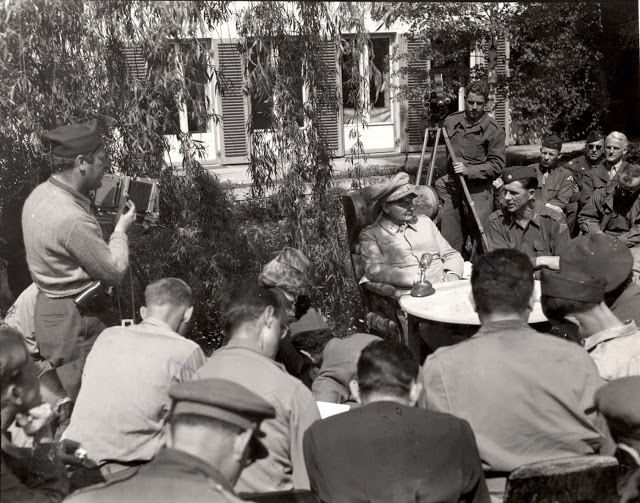The western and eastern inquisitors can satisfy their lust for prosecution only if they succeed in getting hold of all the victims simultaneously in good time. The new KZs designated as “internment-camps,” and the POW-camps in all the zones of occupation, offer them an almost inexhaustible reservoir. Beyond that, however, an unprecedented manhunt begins in all lands and zones — a boom for snitches, slanderers, and informants as never before. England’s foreign minister Anthony Eden proclaims triumphantly in the House of Commons: “The biggest manhunt is in progress, from Norway to the Bavarian Alps.” A million men are sought, hounded, and hunted.
The enormous expenditure has nothing to do with the inevitable success. In contrast to the emigration of the 1930s, only a fraction of the suspects flees abroad. The prominent political and military leaders remain in the country, and some voluntarily turn themselves in.
The second most powerful man in the state, Reich’s Marshal Hermann Goering, finds a way to contact the 36th Division of the U.S. 7th Army through Colonel Bernd von Brauchitsch. At the agreed location, Brigadier-General Robert J. Stack and the Reich’s Marshal meet. Goering raises his marshal’s baton and the American general salutes. Should it not still be possible for victor and vanquished to face each other chivalrously — as after Sedan in 1871 and at Compiègne in 1940? On that occasion the victorious generals Keitel and Jodl had accorded military dignity to Marshal Petain and General Huntziger.
This hope is all too quickly dashed. “Shaking hands with Murder!” howls international trash-journalism[1]. The U.S. brigadier-general with the German name, Stack, had to pay dearly for his chivalry[2]. The “scandal” is played up until it reaches Eisenhower, who overloudly demonstrates his indignation and disapproval[3].
Reich’s Marshal Goering is first brought to the division’s headquarters. The American commander, Major-General John E. Dahlquist, chats[4] innocently with the captured highest German officer. Goering too is naïve enough still to assume that he will be brought to Eisenhower for negotiations. He is quartered in a private home in Kitzbuehel. A dozen reporters appear for an interview lasting several hours. But not a line of it appears in the world press[5]. Eisenhower’s order suppresses these democratic excesses. In a few days the captured Reich’s Marshal metamorphoses into “War-Criminal No. 1.”
In Flensburg on 13 May 1945, the chief of the Supreme Command of the Wehrmacht, Field-Marshal Keitel, is arrested by Englishmen and led away like a criminal. Only four days previously he was accepted as the German representative in surrender-negotiations at the Soviet headquarters in Karlshorst. In this capacity he signed the surrender-document. (Previously, when he is leaving the airport, the biggest limousine is offered to him. Keitel hesitates. “At your service,” says the escorting Russian officer, “You are the Field-Marshal.”)
No top German officer extracts himself from responsibility by fleeing or emigrating. Until 23 July 1945 the former Supreme Commander of the German Navy, Grand-Admiral Raeder, lives outside Berlin in Babelsberg, officially registered and unharrassed. Then he is suddenly arrested with his wife and thrown into the prison at Lichtenberg. Both are freighted off to Moscow and “interned” there until the beginning of the International Military Tribunal at Nuremberg.
_____________________________________
[1]. An article with this title appeared in Britain’s News-Chronicle of 12 May 1945. This was a newspaper that had some reporters, like the Jew Arthur Koestler, who were Communists, and of course their bias was reflected in their writing. The article claimed that U.S. Brigadier-General Stack’s handshake with Goering had angered the British people. The Associated Press quoted the News-Chronicle for American readers, and summarized a similar sentiment expressed by a radio-commentator in Paris. Ironically, it seems that the News-Chronicle derived the expression that formed the title of the piece, “shaking hands with murder,” from an utterance of the right-wing politician Gideon Oliphant-Murray, who had spoken those words 23 years earlier in the House of Lords: “Mr. Gideon Murray made a violent attack on Lloyd George, whom he accused of shaking hands with murder in Russia and Ireland, and whose shiftiness in policy had caused the Empire to lose Ireland.” (Glasgow Herald, 27 June 1922)
[2]. Although Robert J. Stack became notorious as the American general who shook Goering’s hand, in comments 22 years later Stack seems to minimize the extent of his hospitality to Goering and the incident’s importance (The Free Lance-Star, 30 August 1977). It is not evident that Stack suffered in any material way, but embarrassment may have motivated him to represent his interaction with Goering as less friendly and less respectful than it was. The photographic record shows not so much Stark, but certainly his superior, Dahlquist, being quite friendly with Goering, smiling and patting him on the back. The scene of the press-conference also has Goering apparently being treated with great respect, as a celebrity.
[3]. Although Eisenhower refrained from saying specifically who was guilty of “faulty judgment” in his fulminations to the press, the Associated Press, 15 May 1945, attached a large portrait of Dahlquist.
[4]. Dahlquist knew German well enough to chat without the assistance of a translator.
[5]. Haertle seems to be wrong here. Although Eisenhower may have suppressed reports of Goering’s press-conference of 11 May 1945 in the part of Europe under his authority — which would not be at all surprising — some of Goering’s statements were reported in the United States and Canada on 11 and 12 May 1945.


